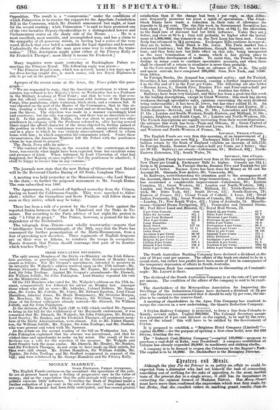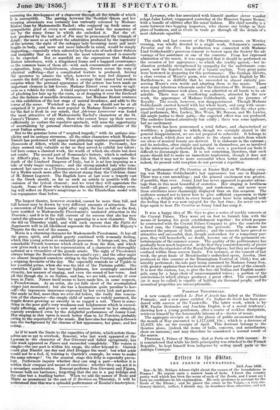64ratrrs Hub 51fitHir.
Although the play Pia dei Tolomei is as paltry an affair as could be expected from a dramatist who had set himself the task of concocting something out,of nothing for the sake of appealing to the most, morbid taste of the present day in a single scene, it still has its importance in correcting the opinion formed of Madame Elston. Her Mary Stuart Must have more. than confirmed the impression which was first made by her Xe(1ea, that she excelled rather; marking mind results t14174-40.. pursuing the development of a character through•all the details of which it is susceptible. . The parting between the Scottish Queen and her weeping attendants was certainly less variously coloured by Madame Ristori than by Mademoiselle Rachel ; who conjured up fresh cause of sympathetic grief at every. new sentence, and broke the monotony of w6 by the many forms in which she embodied it. But the ef- feet produced by the last act of Pia may be pronounced the triumph or detail ; the more so as without the admiration produeed by the ingenuity of the actress, the sight of the unhappy lady becoming more and mere fragile in body, and more and more imbecile in mind, would be'simply disgusting,—espenially when ushered in by four acts of such sheer dulness and insipidity that an audience in the most tolerant mood is scarcely to be expected. But so manifold are the -expressions that Madame Ristori introduces with a dilapidated frame and a haggard countenance as the common basis of them all—with such consummate art are saintly resignation, hope, vindictiveness, clemency, thrown across the warp of physical 'raiffering—that a complicated texture is produced, forcing the spectator to admire the artist, however he may feel disposed to censure the field' of operation. With a courage that cannot but awaken surprise when the personal appearance of the actress has been made an important element in het favour, Madame Ristori even resorts to ugli- ness as a vehicle for truth. A timid aspirant would as soon have thought of- plucking her hair up by the roots, as of dragging it over the forehead after the fashion of maudlin drunkenness:; but Madame Ristori ventures on this exhibition of the last stage of mental decadence, and-adds to the- terror of the scene. Wretched as the play is, we should-not be at all surprised if it proved the most popular in Madame Ristori's repertory ; for the fact is fresh in our minds, that Adrienne Leeouvreur was found the most attractive of all Mademoiselle Rachel's characters at the St. Jamea's•Theatre. At any rate, those who cannot brace up their nerves sufficiently to endure the repulsive spectacle, will miss the opportunity of ascertaining by personal observation the entire capabilities of the great Italian actress. But to'the genuine lover of " sceptred tragedy;" with its antique aim- Plicity. and its antique sternness, all the other characters which Madame Ristori has performed will appear but glittering-vanities compared to-the R,osnuoula of Alfieri, which she sustained last night. Previously, her plays seemed only valuable so far as they served to exhibit her talent ; but here comes a classical work, the worth of which she elicits but-does not confer. The second part of Roamunda's history; which is embodied in Alfierrs play, is less familiar than the first, which comprises the death of _the Lombard Emperor of Italy, but it is no less imposing as a tale - of -truly tragic vengeance; and the strong-minded lady who -com- menced her career as a Clytemnestra is well stocked -with qualities fitted for a Medea much more after the ancient- stamp•than the Colchian dame of M. Ernest Legouve. The English. have at. last, seen a tragedy cast in the Greek mould, as far as such an article possible with the omission of the lyrical element ; and we trust they will appreciate the benefit. Some of those who Witnessed the exhibition of yesterday even- ing will reflect on Byron's misgivings as to the Elizabethan model with less repugnance than before.



























 Previous page
Previous page